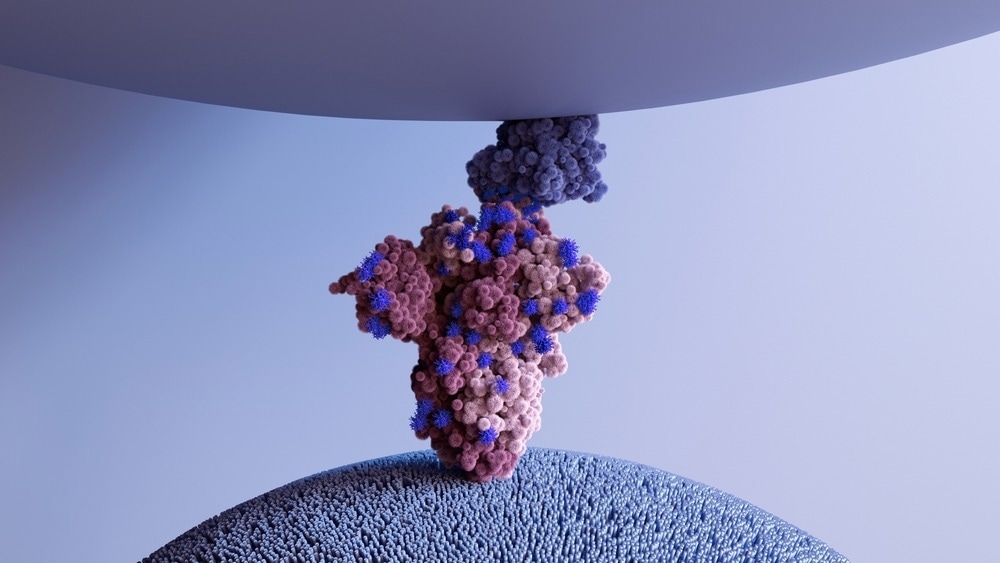Previously, researchers have developed decoy receptor proteins to combat the problem of viruses escaping the host immune response. The main idea behind this strategy is that viruses cannot resist binding to the decoy receptors instead of the host receptor during the invasion.
One of the most common human receptors used for coronavirus cell entry is the angiotensin-converting enzyme 2 (ACE2) receptor. The severe acute respiratory syndrome coronavirus 2 (SARS-CoV-2), for example, which is the causal agent of the current coronavirus disease 2019 (COVID-19) pandemic, utilizes the ACE2 receptor to gain entry into host cells.

Study: Engineering ACE2 decoy receptors to combat viral escapability. Image Credit: Design_Cells / Shutterstock.com
Thus, scientists are extremely interested in analyzing soluble ACE2 as a potential candidate for a decoy receptor against coronaviruses. In a recent Trends in Pharmacological Science journal study, researchers review current developments in preclinical studies associated with recombinant ACE2 decoy receptors against coronaviruses.
Background
The receptor binding domain (RBD) present in the S1 region of the SARS-CoV-2 spike protein binds to the ACE2 receptor of the host cell. Subsequently, the S2 domain promotes membrane fusion, thus allowing the viral genome to enter the host cell. To date, all available COVID-19 vaccines and therapeutics have been designed against the spike protein of the ancestral SAS-CoV-2 strain.
The emergence of several SARS-CoV-2 variants due to genomic mutations has reduced the efficacy of available COVID-19 vaccines. Some of these strains, such as the Delta and Omicron variants, are capable of escaping the immune responses generated by vaccination or natural infection. Thus, there remains an urgent need for alternative pharmaceutical strategies to address the growing issue of viruses like SARS-CoV-2 reducing the efficacy of or escaping available therapeutics.
About the study
In the current study, scientists assess the use of engineered ACE2 decoy as an alternative approach to combat problems related to SARS-CoV-2 genomic evolutions. These receptors can neutralize viruses in a manner that is extremely effective against virus escapability.
Previously, decoy receptors have been applied to control angiogenesis and autoimmune diseases. Some of the most notable decoy receptors to be developed include those based on cytotoxic T lymphocyte-associated antigen‐4 (CTLA4), vascular endothelial growth factor receptor (VEGFR), or tumor necrosis factor receptor (TNFR). Previously, recombinant human soluble ACE2 (rhACE2) was developed as an anti-inflammatory drug for the treatment of acute respiratory distress syndrome (ARDS).
One recent study reported that all virus cultures, including the SARS-CoV-2 Omicron variant and sarbecoviruses, treated with a dilute concentration of ACE2 decoy receptors, remained sensitive to the treatment. During the current pandemic, many research groups have independently designed affinity-enhancing mutations to fuse the human Fc region of immunoglobulins with soluble ACE2 to enhance the pharmacokinetics of antivirals and, as a result, their neutralization efficacy.
Clinical studies related to the application of rhACE2 in both healthy volunteers and ARDS patients have shown no beneficial changes with respect to acute clinical outcomes. However, both study groups showed no adverse reaction to the drug.
The effectiveness of rhACE2 as a decoy receptor has also been assessed for COVID-19 treatment. To this end, Phase II clinical trials have demonstrated that this intravenous treatment did not improve the clinical outcome of COVID-19 hospitalized patients. However, small improvements were reported in pulmonary gas exchange efficiency.
Because rhACE2 monomers have a short half-life of approximately three hours with a fast clearing rate, they lack suitable effectiveness in treating this disease. Importantly, according to a Phase I clinical trial report, rhACE2 inhalation was well tolerated and safe.
The therapeutic potential of rhACE2 as a decoy receptor against COVID-19 could be improved through ACE2 mutagenesis approaches. This strategy can enhance binding affinity and fusion to Fc, which could prolong the half-life of these agents, as well as enhance antiviral immune responses and avidity effects, both of which are essential features of effective COVID-19 therapeutics.
As compared to native ACE2, ACE2 decoy receptors must exhibit a higher affinity for the SARS-CoV-2 spike protein. This could ensure competitive neutralization of the virus at the host cell surface using standard biologic doses. Some of the methods used to achieve high-affinity virus neutralizers include direct evolution with error-prone polymerase chain reaction (PCR) and staggered extension process (StEP).
Deep mutational scanning (DMS) is another method used for comprehensive mutagenesis analysis. Although this approach provides large data related to single amino acid substitutions that help understand intrinsic protein properties, the lack of a standard method can cause issues in selecting which mutations could be combined synergistically.
This problem could be solved through computational modeling, which helps predict the effective combination without affecting the stability or binding free energy of the protein. For example, the multiple sequence alignment (MSA) model has been used to align more than three biological protein or DNA sequences to analyze the homology and evolutionary relationship between sequences.
Future perspectives
ACE2 decoy receptors can effectively mitigate challenges associated with virus escapability. Evidence from previous studies related to DMS and ACE2 mutagenesis strongly support the possibility of using ACE2 decoy receptor proteins at a minimal dose against SARS-CoV-2 variant infection.
Comprehensive screening for engineered ACE2 decoy receptors to endogenous proteins, particularly membrane proteins, will help ascertain the risks associated with potential off-target effects. Taken together, the authors of the current study are optimistic that ACE2 decoy receptors could be effective against the currently circulating as well as new coronaviruses.
Journal reference:
- Arimori, T., Ikemura, N., Okamoto, T., et al. (2022) Engineering ACE2 decoy receptors to combat viral escapability. Trends in Pharmacological Sciences. doi:10.1016/j.tips.2022.06.011.